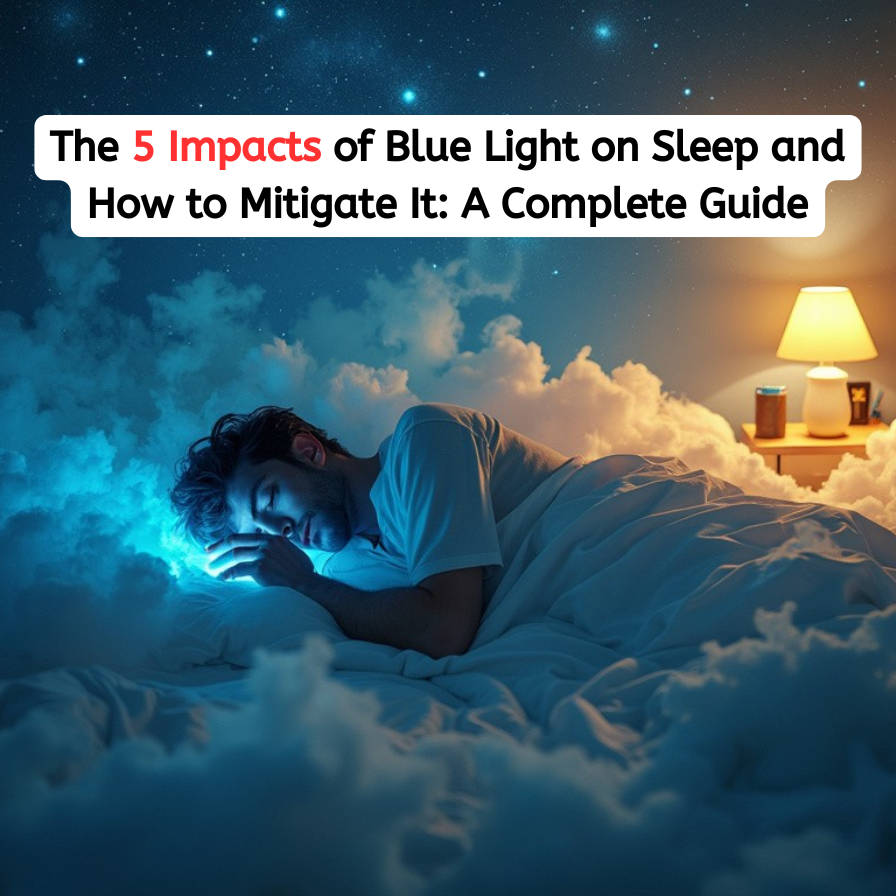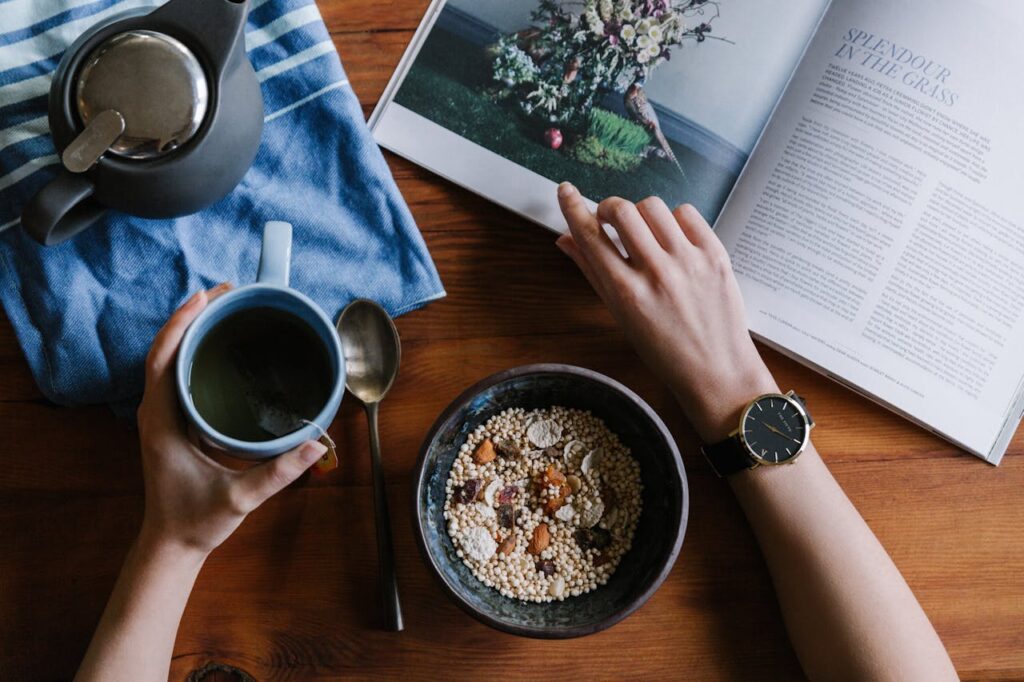The 5 Impacts of Blue Light on Sleep and How to Mitigate It: A Complete Guide
Introduction
Hey there! If you’re like me, you probably spend a good chunk of your day staring at screens—whether it’s your laptop, phone, or TV. But have you ever wondered how all that screen time might be affecting your sleep? Today, we’re diving into the 5 impacts of blue light on sleep and, more importantly, how to mitigate them.
Let’s start with the basics. Your circadian rhythm is your body’s internal clock that regulates your sleep-wake cycle. Blue light, which is emitted by electronic devices, can throw this clock off balance.
1. Disrupting Your Circadian Rhythm
Understanding the Circadian Rhythm
Your circadian rhythm is essentially your body’s internal clock. It regulates your sleep-wake cycle, ensuring that you feel alert during the day and sleepy at night. This rhythm is influenced by various factors, including light exposure.
How Blue Light Affects the Circadian Rhythm
Blue light, which is emitted by electronic devices like smartphones, tablets, and computers, can trick your brain into thinking it’s still daytime. This is because blue light mimics the natural light of the sun. When your brain perceives blue light, it suppresses the production of melatonin, a hormone that signals your body to prepare for sleep.
Case Study: Remember when you stayed up late binge-watching that new Netflix series? You probably noticed it was harder to fall asleep afterward. That’s because the blue light from your screen was telling your brain it was still daytime, messing with your natural sleep cycle.
Mitigation Tip: Set a Screen Curfew
One of the most effective ways to mitigate the impact of blue light on your circadian rhythm is to set a screen curfew. Try to avoid using electronic devices a couple of hours before bedtime. This gives your body enough time to produce melatonin and prepare for sleep.
Use this time to engage in relaxing activities like reading a book, meditating, or doing some light stretching. Your body will thank you for it!
2. Suppressing Melatonin Production
The Role of Melatonin in Sleep
Melatonin is a hormone that plays a crucial role in regulating your sleep. When it’s dark, your body produces more melatonin, signaling that it’s time to sleep. This hormone helps you fall asleep faster and stay asleep longer.
Blue Light and Melatonin Suppression
Blue light, however, suppresses the production of melatonin. When you’re exposed to blue light, especially in the evening, your brain thinks it’s still daytime and reduces the production of melatonin. This makes it harder for you to fall asleep and can lead to poor sleep quality.
Funny Story: I once had a friend who swore by wearing sunglasses indoors to block out blue light. While it was a bit extreme (and hilarious), it highlights the importance of reducing blue light exposure before bed.
Mitigation Tip: Use Blue Light-Blocking Glasses
Consider using blue light-blocking glasses. These glasses are designed to filter out blue light, reducing the amount that reaches your eyes. While they might look a bit nerdy, they can significantly improve your sleep quality.
Blue light-blocking glasses are especially useful if you have to use electronic devices in the evening. They allow you to work or relax without disrupting your sleep.
3. Reducing Sleep Quality
The Importance of Sleep Quality
Sleep quality is just as important as sleep quantity. Good sleep quality means you wake up feeling refreshed and energized. Poor sleep quality, on the other hand, can leave you feeling groggy and unrested, even after a full night’s sleep.
Blue Light and Sleep Quality
Blue light exposure can reduce the quality of your sleep. Even if you manage to fall asleep, the blue light you were exposed to before bed can disrupt your sleep cycles, leading to poor sleep quality.
Example: Think about those nights when you wake up feeling like you’ve been hit by a truck. Chances are, you were exposed to blue light right before bed. This disruption in your sleep cycles can leave you feeling tired and unrested.
Mitigation Tip: Enable Night Shift or Night Light Features
Most modern electronic devices come with features like Night Shift (iOS) or Night Light (Android) that adjust the screen’s color temperature to reduce blue light emission. These features automatically adjust the screen’s color to warmer tones, which are less disruptive to your sleep.
Step-by-Step Guide:
- iOS: Go to Settings > Display & Brightness > Night Shift. You can schedule Night Shift to turn on automatically at a specific time or based on sunset and sunrise.
- Android: Go to Settings > Display > Night Light. You can schedule Night Light to turn on automatically at a specific time or based on sunset and sunrise.
4. Increasing Alertness
Blue Light and Brain Stimulation
Blue light stimulates your brain, making you feel more alert. While this can be great during the day, it’s not so helpful when you’re trying to wind down for the night. Blue light exposure in the evening can make it harder for you to fall asleep and can disrupt your sleep cycles.
Personal Anecdote: Late-Night Work and Insomnia
I used to work late into the night on my laptop, thinking I was being productive. But I’d end up wide awake, unable to sleep. It wasn’t until I started limiting my screen time that I realized how much blue light was affecting my alertness.
Mitigation Tip: Use Apps like f.lux or Twilight
Apps like f.lux (for computers) and Twilight (for Android) automatically adjust the color temperature of your screen based on the time of day. These apps make your screen color warmer in the evening, reducing the amount of blue light emitted.
Benefits:
- f.lux: This app adjusts the color of your computer’s display to the time of day, warming up the colors at night and returning them to normal in the morning.
- Twilight: This app filters the flux of blue light emitted by your phone or tablet after sunset and protects your eyes with a soft and pleasant red filter.
5. Long-Term Health Effects
Chronic Sleep Disruption and Health Risks
Chronic sleep disruption due to blue light exposure can have long-term health effects. Poor sleep quality has been linked to an increased risk of obesity, diabetes, and even heart disease. When your body doesn’t get the rest it needs, it can’t function at its best.
Case Study: E-Readers vs. Print Books
A study published in the journal Sleep found that participants who used e-readers before bed took longer to fall asleep and had reduced melatonin levels compared to those who read print books. The study also found that participants who used e-readers reported feeling less alert the next morning.
Mitigation Tip: Invest in a Physical Alarm Clock
One simple way to reduce blue light exposure before bed is to invest in a physical alarm clock. This way, you won’t be tempted to check your phone right before bed or in the middle of the night.
Using a physical alarm clock also helps you create a healthier sleep environment. You can keep your phone out of the bedroom, reducing the temptation to scroll through social media or check emails before bed.
Conclusion
Blue light is a real sleep disruptor, but with a few simple changes, you can mitigate its effects and enjoy better sleep. Remember, it’s all about balance. You don’t have to give up your devices entirely, just be mindful of how and when you use them.
In this complete guide, we’ve covered the 5 impacts of blue light on sleep and provided practical tips to mitigate them. From setting a screen curfew to using blue light-blocking glasses, there are plenty of ways to improve your sleep quality.



